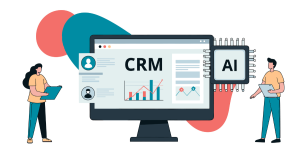A well-maintained Customer Relationship Management (CRM) system is a beautiful thing. It’s the one place you, or anyone else in your organization, can expect to see a 360-degree view of your customer interactions, sales performance, and marketing insights that help improve engagement, boost sales, and make more informed decisions. Essentially, it’s the digital brain of your business. When something is as important as your CRM, it needs looking after.
Unfortunately, we don’t always take the best care of our CRM systems. This can result in lost opportunities, poor customer experiences, and less-than-optimized returns. In this article, we’ll examine why your CRM strategy isn’t working and how you can fix it. But before we dive into all those CRM best practices that will help you thrive, let’s remind ourselves what a good CRM system can do for your business.
What a Well Maintained CRM Will Tell You
You should never underestimate the power of your CRM. Despite this, many companies fail to maximize their CRM system’s capabilities, only using a fraction of its features.
If you’re not leveraging your CRM to manage the following aspects of your business, you’re missing out on its full potential.
- Customer Interactions: A CRM tracks every touchpoint with your customers, from emails and calls to meetings and purchases, ensuring you have a complete history of their engagement with your business.
- Sales Performance: It provides real-time insights into your sales pipeline, helping you monitor deals, identify trends, and forecast revenue with greater accuracy.
- Lead and Opportunity Tracking: A CRM helps you manage leads effectively by scoring potential customers, tracking follow-ups, and ensuring no opportunity falls through the cracks.
- Customer Preferences and Behavior: By analyzing customer interactions and past purchases, a CRM enables you to personalize marketing and sales efforts based on individual preferences and needs.
- Task and Workflow Automation: It streamlines repetitive tasks such as follow-up emails, reminders, and reporting, freeing up your team’s time to focus on more strategic activities.
- Team Collaboration: A CRM allows multiple teams, such as sales, marketing, and customer services, to access and share critical information, improving coordination and efficiency.
- Customer Support History: By maintaining records of past support requests and resolutions, a CRM helps customer service teams provide faster, more personalized assistance.
- Marketing Insights: It tracks campaign performance, customer engagement, and ROI, enabling businesses to refine their marketing strategies for better results.
- Reporting and Analytics: A CRM offers detailed reports on key business metrics, helping you make informed, data-driven decisions to drive growth and efficiency
Why Do CRMs Fail to Deliver ROI?
Tough love time. There are many reasons why your CRM system might not be delivering a positive experience for your organization. More often than not, it’s not the CRM system’s fault. Here are the main reasons why CRM campaign strategies fail:
Poor Data Quality = Poor Decisions
Your CRM is only as good as the data inside it. Incomplete, outdated, or duplicate records lead to missed opportunities, inaccurate reporting, and wasted resources. If your sales and marketing teams don’t trust the data, they won’t rely on the system, rendering your CRM little more than an expensive contact database. This lack of trust can lead to poor decision-making, ineffective marketing campaigns, and, ultimately, a decrease in ROI.
Lack of Integration with Marketing Automation
A CRM should work hand-in-hand with your marketing automation tools, providing a seamless data flow between sales and marketing. Without this connection, leads get lost, follow-ups fall through the cracks, and marketing campaigns run without real insight into customer behavior, making it impossible to nurture prospects effectively.
Low User Adoption & Resistance to Change
The most sophisticated CRM in the world is useless if your team doesn’t use it. Many CRM failures stem from poor onboarding, lack of training, or simply resistance to change. If sales teams find the system clunky or time-consuming, they’ll default back to spreadsheets and personal notes, leaving the CRM underutilized and ineffective.
Overcomplicated or Misaligned Processes
A CRM should simplify sales and marketing, not add unnecessary complexity. If your system is too rigid, difficult to navigate, or packed with unnecessary features, your team will struggle to adopt it. Worse still, if your CRM doesn’t align with your actual business processes, it becomes a frustrating barrier rather than a tool for success.
Failure to Leverage Insights & Reporting
Your CRM isn’t just a place to store contacts; it’s a goldmine of insights that can drive better decision-making. However, many businesses fail to use their CRM’s reporting and analytics features effectively. You’re missing out on opportunities to optimize performance and increase revenue without tracking key metrics, monitoring sales pipelines, or analyzing customer interactions.
How to Optimize Your CRM for Better ROI
If your CRM isn’t delivering the results you expect, it’s time to optimize. Here’s how to turn your system into a powerful engine for growth, efficiency, and customer engagement:
Clean Data, Better Decisions
Poor data quality is one of the biggest CRM killers. Duplicate entries, outdated contacts, and incomplete records make it impossible to trust the system. Implement regular data hygiene practices, including automatic deduplication, mandatory data fields, and periodic audits. Clean data ensures your sales and marketing teams work with accurate, actionable insights—not a mess of unreliable information.
Automate Lead Scoring & Segmentation
Not all leads are created equal. Without an automated lead scoring and segmentation system, your team wastes valuable time chasing the wrong prospects. By using behavioral data, engagement levels, and predictive analytics, you can automatically prioritize leads most likely to convert, ensuring sales focus on high-value opportunities while marketing nurtures cold leads effectively.
Align Sales & Marketing for a Unified Approach
A CRM should act as the bridge between sales and marketing—not a wall separating them. Too often, misalignment leads to missed follow-ups, inconsistent messaging, and lost revenue. By setting up shared goals, real-time lead tracking, and automated workflows, both teams can work together seamlessly to nurture prospects, close deals faster, and enhance customer retention.
Make CRM Adoption Easy & Intuitive
If your team hates using the CRM, it won’t deliver ROI. The key? Simplicity and usability. Invest in user training, intuitive dashboards, and mobile accessibility to ensure sales reps can log activity and access insights effortlessly. Automate tedious data entry where possible, freeing up your team to focus on selling instead of admin work.
Leverage AI & Predictive Analytics
Modern CRMs are more than just storage systems—they’re intelligent business tools. By integrating AI-powered analytics, your CRM can help identify trends, predict customer needs, and suggest next-best actions. This proactive approach means your team is always one step ahead, engaging customers at the right time with the right message.
Integrate with Marketing Automation for Seamless Workflows
A disconnected CRM is an inefficient CRM. Integrate it with your marketing automation tools to ensure every customer interaction—from first touchpoint to post-sale engagement—is logged and leveraged for better decision-making. This integration allows for personalized email campaigns, real-time lead tracking, and automated follow-ups, creating a cohesive customer journey that drives conversions.
Turn Your CRM into a Revenue Engine
Your CRM is much more than an expensive contact list. It is the central nervous system of your business. By focusing on data hygiene, automation, alignment, and AI-driven insights, you’ll transform your CRM into a powerful tool that delivers measurable ROI. Get it right, and your CRM won’t just store data; it’ll drive revenue, enhance efficiency, and fuel long-term business growth.
Learn More
To learn more about how the emfluence Marketing Platform integrates with your CRM system, helping you deliver the right message to the right person at the right time via email marketing automation and SMS campaigns, schedule a call with one of our CRM experts today at expert@emfluence.com.


